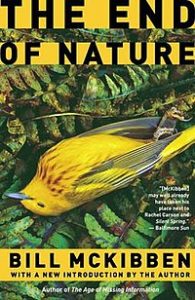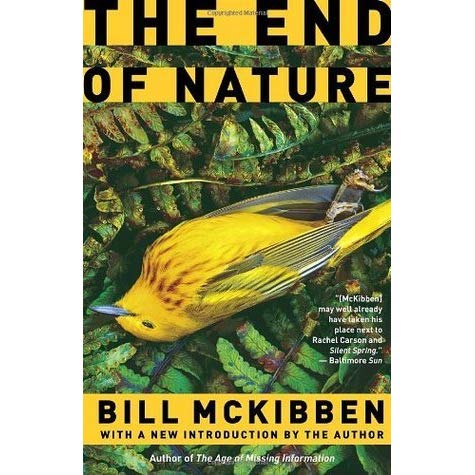
by Carlo Uchello
“How can modern Christianity have so solemnly folded its hands while so much of the work of God was and is being destroyed?”
– from “The Art of the Commonplace” by Wendell Berry
The Civil Rights Movement. Equal Rights for Women. The Anti-War Movement. Anti-Apartheid. Equal Rights for LGBTQ persons. Animal Rights. Occupy Wall Street and the 99%. All of these movements have, in their own ways, reshaped the political, social, and moral landscape of America. All of these movements have been of monumental significance to their proponents. Yet none of them may be as important as the great moral issue of our time – the Climate Crisis.
Bill McKibben published The End of Nature in 1989, and it is widely recognized as the first book for lay readers on the subject of climate change. He wrote a new introduction to the book 16 years later when it was republished in 2005 in which he lamented the (at best) half-steps we’ve taken to address the problem. Now we’re in 2019, some 14 years later. So it’s been 30 years in all since the book was first published, and we’re still arguing over whether the earth is warming because of our actions or if this is a natural cycle of events.
Is Bill McKibben really saying that nature itself will somehow cease to exist? Yes and no. What’s he saying – what he’s been saying since 1989, when The End of Nature was first published – is that we can no longer look at nature and be comfortable in the knowledge that it’s what God intended, because we’ve already forever changed the climate and as a result, we’ve changed nature itself. McKibben writes, “We have changed the atmosphere, and thus we are changing the weather. By changing the weather, we make every spot on earth man made and artificial.” We have changed the composition of the atmosphere, which changes climate trends, which changes when and where and how much rain falls, and we’ve changed when winter starts and when it ends. In turn, that changes which plants and trees will grow, and which invasive plants and insects will thrive. It changes the global food chain and all of animal life on earth. It affects which animals will live and which will go extinct. Because change is happening so much more quickly than it should, animals can’t adapt as quickly if instead those changes were spread out over millennia instead of decades.
And so, the nature that we’re looking at now, and what we will be looking at in 10, 50, or 100 years won’t be the same nature that we grew up with. It’s not only that we’re leaving our children and grandchildren with a vastly different set of challenges to face than any generation in the history of humankind. It’s that what we’re leaving them isn’t nature. It’s unnatural, to be precise.
Religious people consider nature to be a reflection of God’s love for us, but even non-religious people can feel a sense of awe in nature. In fact, for many non-religious people, nature has replaced God (or at least, organized religion) as their source of their sense of belonging to something larger than themselves. McKibben says, “the earth is a museum of divine intent.” What happens to that when nature is no longer what it once was? How much nature do we have to lose before it loses its ability to move us emotionally?
McKibben isn’t pointing his finger at only certain people. He says that “A bipartisan effort to do nothing has been wildly successful.” The sad reality is that neither political party in the United States has done nearly enough to make a difference, and therefore all of us bear the responsibility for inaction.
The End of Nature is divided into two primary sections, entitled “The Present” and “The Near Future,” and while the book’s primary focus is climate change, in the second part Bill McKibben addresses what in 1989 was the still nascent field of genetic engineering. By altering the genetic makeup of the foods we eat, not only are we playing God (with varying degrees of concern about the consequences), but once again we are ending nature as we have known it since the first humans walked the earth. McKibben doesn’t develop the idea very far, and it’s hard to be critical of this omission given when he wrote the book as well as how his emphasis is on climate change. He seems to agree that some genetic engineering may be beneficial in the short term if we can continue to grow crops that resist drought or heat, but again, it is still an alteration of what is “natural” and therefore yet another case where humans have forever altered the natural order of things. And if the past is any prologue, there are almost always unintended consequences of our actions.
When it gets too hot and dry to grow the crops needed to survive, people will move by necessity in search of more temperate climates. Refugees are already on the move because of climate crisis, and it’s not only people being displaced in far-off parts of the world where we think it doesn’t affect us. The Washington Post recently published an article about Guatemalan farmers who are heading north because their crops have failed for several consecutive years, because of the heat and the lack of water. These are some of the migrants who are crossing the border from Mexico into the United States.
Virtually all experts agree that the main culprit is the burning of fossil fuels. We may be approaching the end of the era of fossil fuels, but the faster we can wean ourselves from them, the better the chance that we can avoid a nightmare scenario. But it won’t be easy or pleasant. Fossil fuels have enabled our high standard of living and have removed the onus of manual labor from the backs of millions of people.
The world can act when it is necessary, such as when chlorofluorocarbons (or CFCs) were banned after it was discovered that their usage directly contributed to the depletion of the ozone layer. But getting governments to reduce or eliminate the burning of fossil fuels will be take much more effort and coordination than it did to have them banning the creation and usage of CFCs. The changes that will be required will have to affect virtually everyone’s life in many ways, from how we warm and cool ourselves to how we get from Point A to Point B; from what we use to pack and transport our groceries to the types of fabrics we wear. It will certainly be disruptive. It’s a pipe dream to expect that all of the needed changes will happen at once or that they will affect everyone equally. But they’ll have to be done, and the sooner, the better.
But how do we, in the highly industrialized western world, tell China, India, and all of the other aspiring and emerging economies of the world that they can’t avail themselves of the same easy and cheap energy sources that we’ve used for the past 100 years (and which we continue to use)? What moral authority do we really have?
Saying or even hoping that we will innovate our way out of this predicament or that we’ll find a way to reverse the damage already done is merely relying on blind faith that allows us to continue to shift responsibility onto future generations. They will not be forgiving for what we have done, or what we have failed to do. Our inaction only allows us to sit back and let someone else solve the problem. It’s about as solid a plan as eating, drinking, and smoking ourselves to oblivion and then counting on doctors or medicines to cure us of all our ailments.
It’s been told so many times that all you need to hear is a reference to the story of the frog in a pot of water. Except that it doesn’t really end the way you think it does. According to the story, if you put a frog in a pot of water on a stove top and gradually heat the water, the frog won’t notice the change and jump out of the water. Instead, he becomes desensitized to the heat and will slowly burn to death. But in reality, frogs are actually smarter than that. They will actually notice the change in temperature and jump out of the heating pot.
We have spent decades creating the ecological mess we’re in and we continue to increase our impact on the delicate balance of nature that has evolved over millennia. Now we’ve become the frog in the pot of water, and we can feel it heating up. But we’re not jumping out of the pot. We seem to be enjoying our warming environment so much that we can’t conceive of how we can give up our addition to fossil fuels and the comfortable lifestyle to which we’ve grown accustomed. We’re so accustomed to the changing environment that continuing our suicidal behavior seems to be the most natural thing to do. God gave us this garden in which to live, and instead of tending to it like the careful stewards we were instructed to be, we have abused it and abased it and treated it with contempt.
We’ve all seen footage of large chunks of glaciers calving from Antarctica, and many of us have seen the retreating glaciers in Alaska with our own eyes. So perhaps it’s somewhat understandable that we’re not paying to attention to what the fuss is all about. Glaciers melt and break apart and the water level has barely increased, right? And that’s pretty much true (though there has been a small increase in sea level). But if a catastrophic breakup occurs and either Greenland or West Antarctica should become free of ice, the estimate is that sea level would rise by 20 feet. And if the ice of East Antarctica should melt away (which fortunately, no one is expecting anytime soon), then sea level would rise by another 200 feet.
It is our great misfortune to be alive at a time when trust in experts is at an all-time low. It’s a time when we can’t be confident that the medical advice we’re given isn’t being influenced by Big Pharma. It’s a time when dire pronouncements from scientists are considered by some to be merely political statements with no basis in reality. For now is the time that we truly need to take heed and follow the growing chorus of experts and moral leaders who warn us that we are destroying God’s creation.
The only question is this: will we act now to lessen the effects on our children and grandchildren, and the world of the future? Or will we continue to delay taking meaningful steps to address this challenge and therefore forever continue to change nature for all future generations?

The End of Nature
Bill McKibben
Penguin Random House
Carlo Uchello is a member of St. Luke’s Episcopal Church in Alexandria, Virginia, where he serves as a Lector/Chalicer and on the Altar Guild. He has previously served on the Adult Education Committee.

